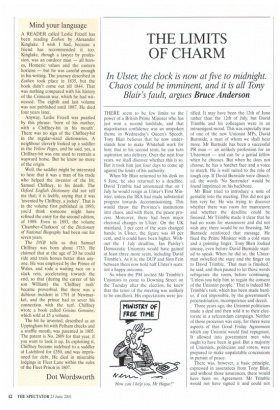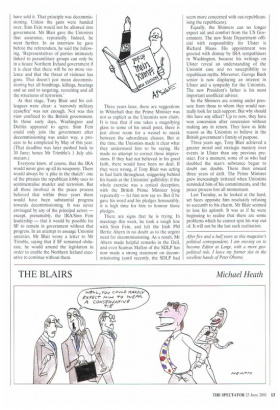THE LIMITS OF CHARM
In Ulster; the clock is now at five to midnight.
Chaos could be imminent, and it is all Tony
Blair's fault, argues Bruce Anderson
THERE seem to be few limits to the power of a British Prime Minister who has just won a second landslide, and that majoritarian confidence was an unspoken theme in Wednesday's Queen's Speech. Tony Blair believes that he now understands how to make Whitehall work for him; that in his second term, he can turn aspiration into delivery. Over the next four years, we shall discover whether this is so. But it took him just four days to come up against the limits of his authority.
When Mr Blair returned to his desk on 8 June, he also returned to a deadline. David Trimble had announced that on 1 July he would resign as Ulster's First Minister, unless the IRA had made substantial progress towards decommissioning. This would throw the Province's institutions into chaos, and with them, the peace process. Moreover, there had been major electoral changes in Ulster. On the UK mainland, 3 per cent of the seats changed hands; in Ulster, the figure was 40 per cent, and it could have been higher. Without the 1 July deadline, Ian Paisley's Democratic Unionists would have gained at feast three more seats, including David Trimble's. As it is, the DUP and Sinn Fein between them now hold half Ulster's seats: not a happy outcome.
So when the PM invited Mr Trimble's Unionists to come to Downing Street on the Tuesday after the election, he knew that the tenor of the meeting was unlikely to be emollient. His expectations were jus tified. It may have been the 12th of June rather than the 12th of July, but David Trimble and his colleagues were in an intransigent mood. This was especially true of one of the new Unionist MPs, David Burnside, a man of whom we shall hear more. Mr Burnside has been a successful PR man an unlikely profession for an Ulsterman — and can be a genial fellow when he chooses. But when he does not choose, he has a hatchet face and a voice to match. He is well suited to the role of tough cop. If David Burnside were dissected, the words 'No Surrender' would be found imprinted on his backbone.
Mr Blair tried to introduce a note of geniality into the meeting. This did not get him very far. He was trying to discover whether there was room for manoeuvre and whether the deadline could be finessed. Mr Trimble made it clear that he had no room for manoeuvre and did not wish any; there would be no finessing. Mr Burnside reinforced that message. He fixed the Prime Minister with a cold stare and a pointing finger. Tony Blair looked uneasy, even before David Burnside started to speak. When he did so, the Ulsterman swivelled the stare and the finger on to David Trimble. 'That man is finished,' he said, and then paused to let those words refrigerate the room, before continuing, 'Unless you help him to regain the consent of the Unionist people,' That is indeed Mr Trimble's task, which has been made harder, if not impossible, by the government's procrastination, incompetence and deceit.
Three years ago, the Unionist politicians made a deal and then sold it to their electorate in a referendum campaign. Neither of those processes was easy, for there were aspects of that Good Friday Agreement which any Unionist would find repugnant. It allowed into government men who ought to have been in gaol. But a majority of Unionists, politicians and voters, were prepared to make unpalatable concessions in pursuit of peace.
There was, however, a basic principle, expressed in assurances from Tony Blair, and without those assurances, there would have been no Agreement. Mr Trimble would not have signed it and could not have sold it. That principle was decommissioning. Unless the guns were handed over, Sinn Fein would not be allowed into government. Mr Blair gave the Unionists that assurance, repeatedly. Indeed, he went further. In an interview he gave before the referendum, he said the following, 'Representatives of parties intimately linked to paramilitary groups can only be in a future Northern Ireland government if it is clear that there will be no more violence and that the threat of violence has gone. That doesn't just mean decommissioning but all bombings, killings, beatings and an end to targeting, recruiting and all the structures of terrorism.'
At that stage, Tony Blair and his colleagues were clear: a 'narrowly military ceasefire' was not enough. Nor was this view confined to the British government. In those early days, Washington and Dublin appeared to agree. Sinn Fein could only join the government after decommissioning was under way, a process to be completed by May of this year. (That deadline was later pushed back to 30 June; hence Mr Trimble's 1 July ultimatum.) Everyone knew, of course, that the IRA would never give up all its weaponry. There would always be 'a pike in the thatch': one of the phrases the republican lobby uses to sentimentalise murder and terrorism. But all those involved in the peace process believed that within three years there would have been substantial progress towards decommissioning. It was never envisaged by any of the principal actors — except, presumably, the IRA/Sinn Fein leadership — that it would be possible for SF to remain in government without that progress. In an attempt to assuage Unionist anxieties, Mr Blair wrote a letter to Mr Trimble, saying that if SF remained obdurate, he would amend the legislation in order to enable the Northern Ireland executive to continue without them. Three years later, there are suggestions in Whitehall that the Prime Minister was not as explicit as the Unionists now claim. It is true that if one takes a magnifying glass to some of his small print, there is just about room for a weasel to sneak between the subordinate clauses. But at the time, the Unionists made it clear what they understood him to be saying. He made no attempt to correct those impressions. If they had not believed in his good faith, there would have been no deal. If they were wrong, if Tony Blair was acting in bad faith throughout, sniggering behind his hands at the Unionists' gullibility; if the whole exercise was a cynical deception, with the British Prime Minister lying repeatedly — let him now say so. But if he gave his word and his pledges honourably, it is high time for him to honour those pledges.
There are signs that he is trying. In meetings this week, he took a tough line with Sinn Fein, and left the Irish PM Bertie Ahern in no doubt as to the urgent need for decommissioning. As a result, Mr Ahern made helpful remarks in the Dail, and even Seamus Mallon of the SDLP has now made a strong statement on decommissioning (until recently, the SDLP had seem more concerned with out-republicanising the republicans).
Equally, the Shinners can no longer expect aid and comfort from the US Government. The new State Department official with responsibility for Ulster is Richard Haass. His appointment was greeted with dismay by IRA sympathisers in Washington, because his writings on Ulster reveal an understanding of the Unionist case and no susceptibility to republican myths. Moreover, George Bush senior is now displaying an interest in Ulster and a sympathy for the Unionists. The new President's father is his most important unofficial adviser.
So the Shinners are coming under pressure from those to whom they would normally look for tacit support. But why should this have any effect? Up to now, they have won concession after concession without making any in return. They have as little reason as the Unionists to believe in the British government's firmity of purpose.
Three years ago, Tony Blair achieved a greater moral and strategic mastery over events in Ulster than any previous premier. For a moment, some of us who had doubted the man's substance began to doubt our doubts. There then ensued three years of drift. The Prime Minister grew increasingly irritated when Unionists reminded him of his commitments, and the peace process lost all momentum.
Last Tuesday, as he looked at the hard, set faces opposite him resolutely refusing to succumb to his charm, Mr Blair seemed to lose his aplomb. It was as if he were beginning to realise that there are some problems which he cannot spin his way out of. It will not be the last such realisation.
After five and a half years as this magazine's political correspondent, I am moving on to become Editor at Large, with a more geopolitical role. I leave my former slot in the excellent hands of Peter Obome.



































































 Previous page
Previous page